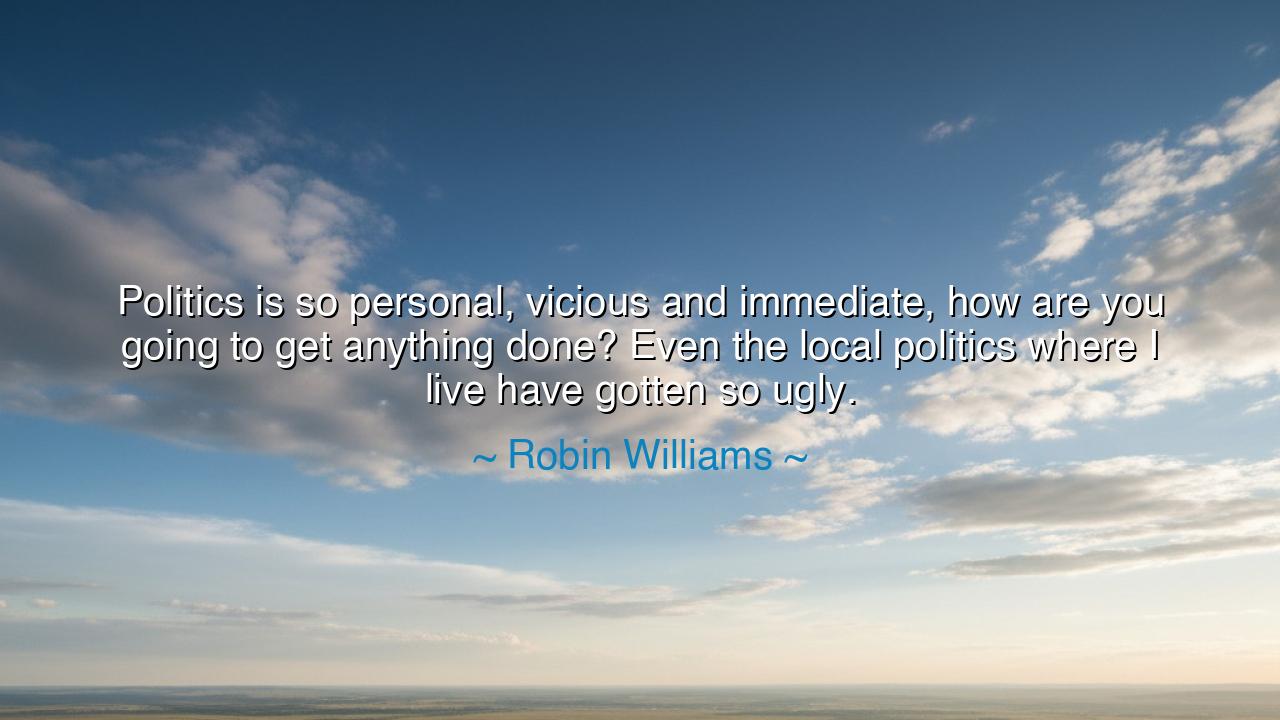
Politics is so personal, vicious and immediate, how are you
Politics is so personal, vicious and immediate, how are you going to get anything done? Even the local politics where I live have gotten so ugly.






When Robin Williams lamented, “Politics is so personal, vicious and immediate, how are you going to get anything done? Even the local politics where I live have gotten so ugly,” he revealed the tragic paradox of public life. Politics, meant to be the art of governance and service, often descends into bitterness, where rivalries become personal feuds, and venom consumes the energy meant for building and healing. In such storms of hostility, the true work of justice and progress is buried beneath quarrels of ego.
The ancients saw this same corruption. In the Athenian assembly, the clash of voices often grew so heated that truth itself was lost, and men sought victory not through reason but through insult. Socrates himself, devoted to wisdom, was condemned in such an atmosphere of vicious politics. Robin’s words echo this ancient sorrow: when governance becomes too immediate, too personal, the greater good is forgotten, and the city suffers.
History provides grim testimony. During the fall of the Roman Republic, politics turned savage and bloody. Senators who once debated policy now wielded daggers; Caesar fell beneath them, slain not in a war of nations, but in the poisonous feuds of his peers. The Republic, instead of advancing, crumbled beneath the weight of personal vendettas. So too in our own day, even the local politics of neighborhoods and towns mirror this same ugliness, as Williams observed.
Yet his words are not only a lament—they are a warning. When politics is consumed by hatred, it ceases to be politics at all. It becomes theater, a battleground for pride, a place where nothing lasting can be achieved. The immediacy of insult blinds leaders to the long vision, the building of institutions, the nurturing of peace. What should serve the people becomes a spectacle of anger, leaving communities wounded and weary.
Thus, let his wisdom endure for the generations: guard against the ugliness of politics, for it is a thief of progress. Let those who govern rise above the personal, resist the vicious, and remember that their task is not to destroy, but to build. For though politics will always be contentious, it must not be consumed by malice. The measure of a nation is found not in the ferocity of its quarrels, but in its ability to find harmony amidst them, and to act for the good of all.






CBNguyen Chi Binh
This quote strikes a chord, especially when you look at the environment around us today. The personal attacks in politics seem to be getting worse, not better. If things continue this way, it seems like there will be no space left for genuine debate or progress. What would it take to shift the focus away from negativity and back to substantive policy discussions that help people? Is the culture of politics simply too entrenched for meaningful change?
DMduc manh
Robin Williams' comment about the 'ugliness' of local politics really made me pause. It’s hard to believe that politics, which should be about serving people, has become so toxic. But perhaps it's a sign of the times—where everything is so immediate and hyper-connected, every mistake or disagreement is amplified. Is it possible to return to a time when public service was about collaboration, or is this current political culture irreversible?
UPUyen Phuong
It’s frustrating to think that even local politics have become so nasty. It almost seems like people have forgotten that the goal should be to improve communities, not just defeat opponents. How can we reclaim civility in politics, or is that something that has been lost forever? What do you think causes this shift in the tone of political debates, especially when local politics should ideally feel closer to the people?
TSTran The Son
Robin Williams’ perspective on politics being 'personal, vicious, and immediate' really hits home. In today's climate, it feels like every action is scrutinized under a magnifying glass. It’s discouraging when politicians focus more on tearing each other down than on finding solutions. How can we expect progress when personal attacks overshadow policy discussions? Is this just a natural outcome of modern political discourse, or is it a deeper issue at play?